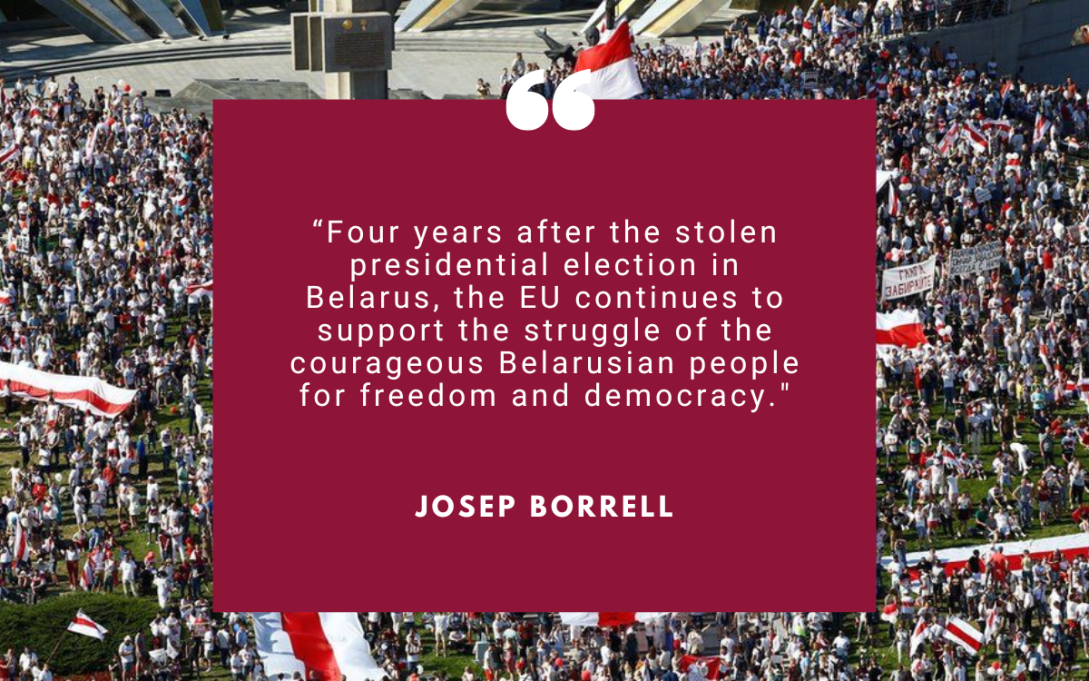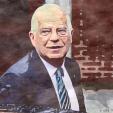The EU continues to stand for a free and democratic Belarus

On 9 August 2020, Belarusians went to the polls with hope for democratic change. Sviatlana Tsikhanouskaya had galvanised the opposition, stepping into the fray after her husband, a prominent blogger, was jailed to prevent his candidacy. Despite overwhelming evidence of electoral fraud, Lukashenka claimed an implausible 80% victory. The EU did not recognise these results; the elections were neither free nor fair.
In the days that followed, this blatant fraud sparked mass protests across Belarus. Tens of thousands of people took to the streets. Lukashenka's regime responded with a brutal crackdown. From 9 to 12 August 2020, riot police detained almost 7,000 protesters and bystanders in Minsk, holding them in inhuman and degrading conditions. Four years later, there are still around 1,400 political prisoners. Ms Tsikhanouskaya, as well as thousands of other Belarusians, was forced into exile. She has become a symbol of Belarusian resistance and the face of the democratic movement abroad.
The repression of summer 2020 not only crushed the immediate hopes for change in Belarus. It also set the country on a path of increasing isolation and growing dependence on Russia. Lukashenka has progressively given away Belarus’ identity and sovereignty to Putin – in order to remain in power.
The most glaring example came in February 2022 when Lukashenka allowed Russian troops to use Belarus’ territory as a launch pad for the invasion of Ukraine. His regime has also been contributing to the deportation of Ukrainian children from the Russia-controlled territories of Ukraine by organising “summer camps” for them, where they undergo ideological and military indoctrination. All this has made Lukashenka an accomplice in Putin’s illegal war of aggression.
Further escalating tensions with his Western neighbours, Lukashenka subsequently agreed to station Russian non-strategic nuclear weapons in Belarus and he discussed operational plans to invade the so-called Suwałki gap, stretching about 70 kilometres along the Lithuanian-Polish border. These statements are part of a strategy to spread disinformation and instil fear in the West.
Already since 2021, the EU’s borders have been the target of hybrid attacks. Lukashenka’s regime encouraged migrants and asylum seekers from the Middle East and Africa to come to Belarus, in order to push them towards the borders of Poland, Lithuania, and Latvia.
These hybrid attacks have forced neighbouring EU Member States to reinforce the security of border crossing points, making mobility more difficult for Belarusian citizens. Lukashenka is leading a wider campaign to hinder people-to-people exchange with the West. Administrative obstacles have been created for those who wish to study abroad and since September 2023, Belarussians have been unable to renew their passports in Belarusian consulates in the EU and elsewhere.
This coincides with an increasing integration of Belarus in the Russian information sphere. The Russian state ideology of Russkiy Mir (“Russian world”) is being promoted, while alternative voices are suppressed. Even the use of the Belarusian language - an official language together with Russian - is increasingly restricted and discouraged.
Belarus’s current plight serves as a dire warning for Ukraine and other states in Russia’s neighbourhood. Vladimir Putin’s vision for Ukraine equals what he is trying to achieve in Belarus: alignment with Russian interests, suppression of civil society, and eradication of democratic aspirations. The fierce fight of the Ukrainian people to maintain sovereignty resonates deeply with many Belarusians who see their own aspirations reflected.
Despite repression, the people of Belarus continue to take action to restore their freedom and their country’s democratic future, often at great personal risk. Political prisoners and their families continue to pay the highest price.
Today’s fourth anniversary of the stolen election serves as a reminder of their tremendous courage but also as a call to action for the international community. The EU has implemented targeted sanctions. These include travel bans and asset freezes on 261 individuals and 37 entities responsible for the repression and for supporting Russia’s war against Ukraine. The EU has also restricted Belarus' access to EU capital markets and limited trade.
At the same time, we have been providing financial support to Belarusian civil society, to independent media and the democratic opposition. I launched last year a specific consultative group. We meet regularly with Belarusian democratic forces and civil society to better understand their needs and the challenges they face, both inside and outside of the country.
The Belarusian people's aspirations for a better future, so clearly expressed four years ago, will not be forgotten. We will continue to support all efforts for a free and democratic Belarus.
MORE FROM THE BLOG

"Une fenêtre sur le monde" - Blog du HR/VP Josep Borrell
Blog de Josep Borrell sur ses activités et la politique étrangère européenne. Vous pouvez également y trouver des interviews, des articles d'opinion, une sélection de discours et de vidéos.
